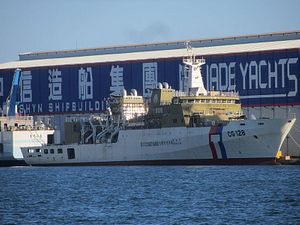From the Tianjin explosions to a currency slide, it’s been an active week in China news. Some stories that may have slipped through the cracks:
First, an update on the situation in Tianjin. The confirmed death count has risen to 56, Xinhua reports, including 21 firefighters. We also have our first news on the scale of the destruction: “Initial estimates say the blasts have affected 17,000 households, 1,700 enterprises and 675 commercial stores, said Zhang Ruigang, vice head of Tianjin Binhai New Area.”
In other news, Taiwan’s CNA reports on a confrontation between Taiwan’s coast guard and Chinese fishermen. A fishing dispute between Taiwanese and Chinese crews turned ugly when the Chinese fishermen allegedly abducted three Taiwanese coast guard officers. The officers had boarded the Chinese vessel under an agreement in which both groups of fishermen would head to Taiwan to resolve their dispute. But the Chinese crew apparently began heading toward China instead, with the Taiwanese officers still on board.
In response, Taiwan’s Coast Guard Administration launched what CNA called a “commando-style operation” to rescue the men. CGA officials, armed with “9mm handguns, M16 assault rifles and Remington 870 12-gauge shotguns” stormed the Chinese fishing vessel and received the officers. In all, 14 shots were fired, according to CGA officials, but there were no injuries to either side reported.
The eight Chinese crewmen from the fishing vessel were being detained for questioning after the incident. Officials told CNA the fishermen would likely face criminal charges.
In other news, Xinhua reports that China’s air force (the PLAAF) conducted a drill in the western Pacific involving “multiple types of aircraft.” The drill saw PLAAF aircraft fly up to 1,000 kilometers beyond the “first island chain,” a military spokesperson said. Being able to operate beyond the first island chain (which stretches from Japan through Taiwan and the Philippines) is a central strategic concern for China. The exact location of the drill was not announced, but the aircraft traveled through the Bashi Channel between Taiwan and the Philippines.
While the international community was watching China’s RMB intensely, another financial story slipped through the cracks. Financial Times reports that China’s famed shadow-banking sector “collapsed in July.” The likely cause? China’s stock market slide. “The data suggest non-bank institutions were spooked as hundreds of companies chose to freeze their shares, grinding shadow loans to a halt last month,” FT says.
Speaking of shadow banking, check out Susan Finder’s piece for The Diplomat on the Supreme People’s Court new judicial interpretation on private lending. It lays out basic rules for private lending, in a way that might bring the sector “out of the shadows.”
Andrew Small, writing for Foreign Policy, explains why the death of former Taliban leader Mullah Omar is bad news for China. “Despite China’s misgivings about the Taliban, Mullah Omar was a man they could do business with, one of the last of the leading political and spiritual authorities in the militant world that was willing to pragmatically accommodate Chinese concerns,” Small writes. Omar’s death comes as militant groups worldwide prove more willing to view China as a potential target – a terrifying trend for Chinese leaders.
The New York Times reports on the amateur drawings that captivated China’s attention earlier this week – a series of sketches of alleged torture at the hands of Chinese police. The drawings, based on the memories of Liu Renwang, who says he was tortured into falsely confessing to a murder case, were published in The Paper, a state-run Chinese media outlet. Liu is seeking compensation from the court that convicted him of the murder (a conviction that has since been overturned).
Finally, the China Media Project explains the context for China’s recent announcement that it will “embed internet police in tech firms.” David Bandurski of CMP points out that this is not a new development – he wryly suggests a new headline of “Police Official Urges Expansion of Website Police Unit Network in Place for Years Already.”

































